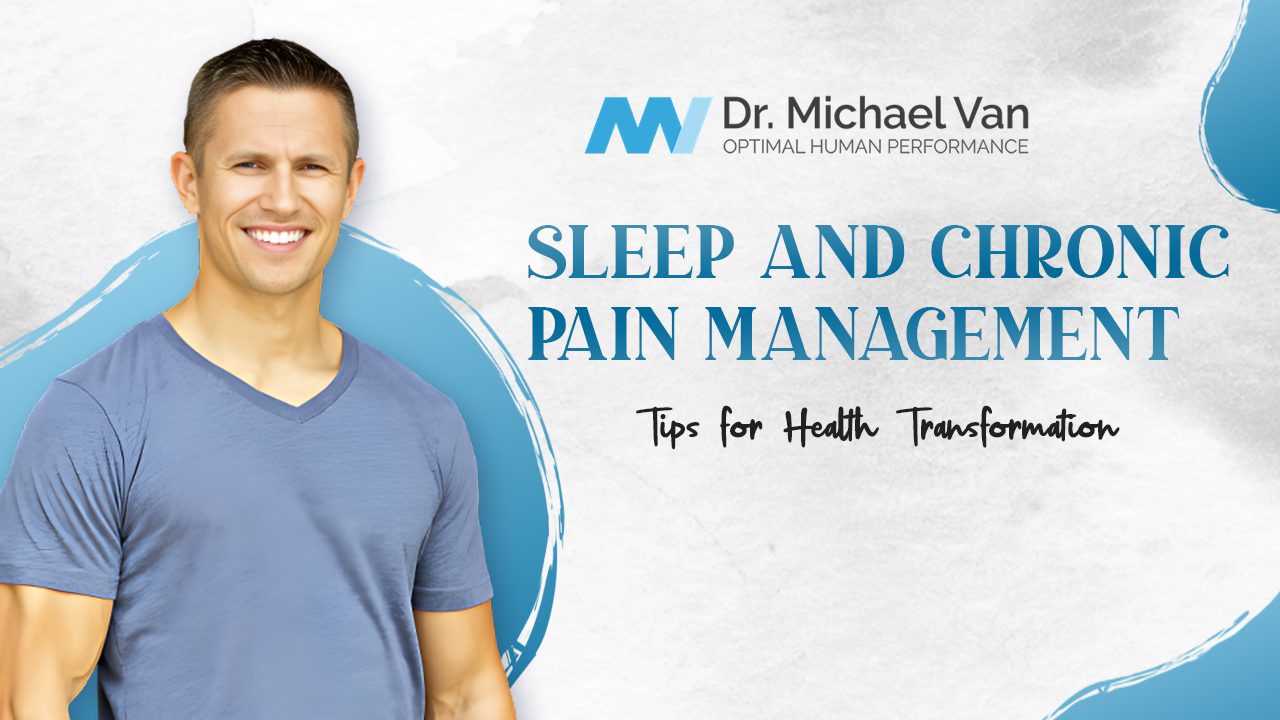Sleep and Chronic Pain Management: Tips for Health Transformation

For individuals living with chronic pain, sleep can often seem elusive, yet it is one of the most vital aspects of overall health and pain management.
Many chronic pain sufferers experience sleep disturbances, which can exacerbate their pain symptoms and negatively impact their emotional well-being.
On the flip side, quality sleep can promote healing, reduce inflammation, and improve mental health, all of which are integral to effectively managing chronic pain and fostering lasting health transformation.
Dr. Michael Van, an expert in chronic pain management and health transformation, understands the crucial role that sleep plays in his patients' overall well-being.
Under his guidance, individuals experiencing chronic pain can learn crucial strategies for optimizing their sleep and harnessing its healing power to achieve profound and lasting transformation.
With Dr. Michael Van's expertise and passion for holistic pain management solutions, chronic pain sufferers will gain valuable knowledge and tools to improve their sleep and ultimately enhance their overall health and well-being.
Stay tuned to our blog for in-depth insights into the amazing power of sleep and learn how to leverage it for a transformative journey to better health, guided by Dr. Van's unwavering dedication to helping his patients live pain-free and truly fulfilling lives.
The Connection Between Sleep and Chronic Pain
Sleep and pain share a complex relationship, with each influencing the other in various ways.
Research has shown that individuals with chronic pain often experience disturbed sleep, which can exacerbate existing pain symptoms and impede the body's natural healing processes.
A lack of quality sleep can lead to increased inflammation, decreased pain tolerance, and heightened emotional distress, all of which contribute to the persistent cycle of chronic pain.
Conversely, obtaining sufficient restorative sleep can benefit chronic pain sufferers by reducing inflammation, enhancing pain resilience, and improving overall emotional well-being.
By understanding the intricate connection between sleep and chronic pain, individuals can prioritize their sleep quality and develop strategies to break the cycle of pain and sleeplessness.

Subscribe To Dr Mike's MVP Newsletter!
Exclusive content, interesting topics, real insights.

Subscribe To Dr Mike's MVP Newsletter!
Exclusive content, interesting topics, real insights.
The Importance of Sleep Hygiene
Improving sleep quality is essential in managing chronic pain, and one way to do this is by practicing good sleep hygiene.
Sleep hygiene refers to the habits, routines, and behaviors that contribute to a healthy sleep environment and promote restful, restorative sleep.
Here are some tips for optimizing sleep hygiene for better pain management:
- Establish a Regular Sleep Schedule: Going to bed and waking up at the same time each day helps regulate the body's internal clock, leading to better sleep quality and consistency.
- Create a Sleep-Friendly Environment: Ensure your bedroom is quiet, dark, and cool, as these conditions promote optimal sleep. Consider investing in blackout curtains, a white noise machine, or a fan to create the ideal sleep atmosphere.
- Limit Electronic Devices Before Bed: Exposure to blue light emitted from phones, tablets, and computers can interfere with the body's production of melatonin, a hormone essential for sleep. Establish a device-free ritual at least an hour before bed to signal to your body that it's time to wind down.
- Avoid Stimulants Close to Bedtime: Caffeine and nicotine can negatively affect sleep by increasing arousal and delaying the onset of sleep. Try to avoid consuming these stimulants within four to six hours of bedtime.
Relaxation Techniques to Ease Pain and Promote Restful Nights
Incorporating relaxation techniques into your evening routine can help alleviate pain and promote restful sleep.
Here are some strategies to consider:
- Mindfulness and Meditation: Practicing mindfulness, such as focusing on deep breathing or engaging in body scan meditation, can help individuals relax their bodies and minds, reducing pain and anxiety that may interfere with sleep.
- Progressive Muscle Relaxation: This technique involves the systematic tensing and relaxing of different muscle groups, helping to release tension and promote relaxation throughout the body. Regular practice can lead to improved sleep and reduced pain symptoms.
- Guided Imagery: Focusing on pleasant images, scenes, or memories can help shift focus away from pain and promote relaxation, making it easier to fall asleep.
- Gentle Movement and Stretching: Engaging in gentle, low-impact activities such as yoga or tai chi can help loosen tight muscles and reduce pain while encouraging relaxation and deeper sleep.
The Impact of Sleep on Mental Health
Quality sleep is essential for overall mental health, as it supports cognitive function, emotional resilience, and mood regulation.
Chronic pain can take a toll on mental well-being, and disrupted sleep can exacerbate feelings of anxiety, depression, and stress.
By prioritizing sleep as part of a comprehensive pain management plan, individuals have the opportunity to improve their mental health, which can ultimately help them better manage pain symptoms and foster overall health transformation.
Conclusion
Quality sleep plays a vital role in chronic pain management and health transformation, supporting the body's natural healing processes and promoting emotional well-being.
By understanding the critical relationship between sleep and pain, and implementing strategies to improve sleep hygiene and incorporate relaxation techniques, individuals struggling with chronic pain can harness the healing power of sleep and pave the way for lasting health transformation.
Take control of your health today with Dr. Michael Van's expert guidance! Try our premium multi-vitamin supplements to boost your immune system and overall wellness.
And if you're struggling with chronic pain and disrupted sleep, let Dr. Van help you manage it with proven techniques and personalized strategies.
Don't wait any longer to feel your best - schedule a consultation with Dr. Michael Van now!
Dr. Michael Vanderschelden, DC
18600 Main St STE 110
Huntington Beach, CA 92648
Copyright ©2025
Site designed by iTech Valet
Subscribe To Dr Mike's MVP Newsletter. Exclusive Content ONLY!
Dr. Michael Vanderschelden, DC
18600 Main St STE 110
Huntington Beach, CA 92648
Copyright ©2025
Site designed by iTech Valet
*These statements have not been evaluated by the Food and Drug Administration. These products are not intended to diagnose, treat, cure or prevent any disease.
